G20 Delegates in Second Environment Climate Sustainability Working Group (ECSWG) meeting at Gandhinagar discuss key issues pertaining to identified priorities with emphasis on developing inclusive, action-oriented outcomes
The second day of the 2nd Environment and Climate Sustainability Working Group (ECSWG) meeting commenced at Gandhinagar, Gujarat with the opening remarks by G20 Co-chair for India, Ms. Richa Sharma, Additional Secretary, Ministry of Environment, Forest and Climate Change. Speaking on the occasion, she emphasised on the need to collaborate with the G20 countries and engage in an inclusive, consensus driven approach and actions to address climate change. She expressed her gratitude to the delegates for their active involvement in the first ECSWG meeting and the Focus Group Discussions between the two working Group meetings on the three thematic priorities. She reaffirmed India’s commitment to facilitate tangible outcomes to build a strong foundation before passing on the baton to the Brazil Presidency.
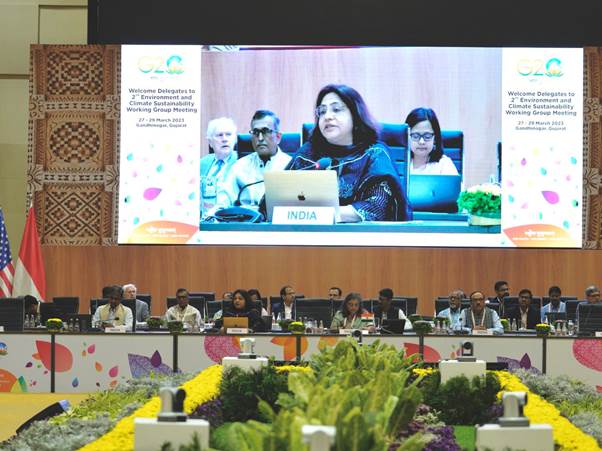
Acknowledging the work of past Presidencies and the deliberations on the three priorities during the 1st ECSWG, Ms. Sharma highlighted the importance of receiving inputs during the technical sessions which would help shape the outcomes for each priority. She further expressed that consistent and enthusiastic participation from all delegates will greatly facilitate the process of finalizing the draft Communique. The representatives from the Troika (Indonesia and Brazil) echoed the Co-Chair’s remarks on the expected outcomes from the G20 India Presidency.
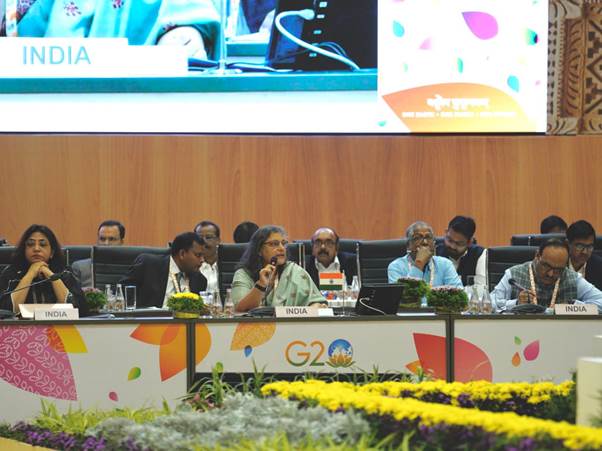
The inaugural session was followed by the first technical session of the day on Water Resource Management, led by Ms. Debashree Mukherjee, Special Secretary, Water Resources, Ministry of Jal Shakti. The presentations made during the session highlighted the need for efficient management of water resources to achieve the overarching UN Sustainable Development Goals and also addressed global water challenges such as climate change, population growth, and increasing water demand. Thematic presentations were also made on Namami Gange -an integrated Conservation Mission to accomplish effective abatement of pollution, conservation and rejuvenation of Ganga, climate resilient infrastructure – water storage/ Dam Rehabilitation & Improvement Project (DRIP), participatory ground water management, Jal Jeevan mission – a project to provide safe and adequate drinking water by 2024 to all households in rural India, and Swachh Bharat - the project on Universalization of Water Sanitation & Hygiene and its effects. These presentations further corroborated the ever-demanding need of such initiatives to address the depleting level of ground water at an alarming rate. The G20 countries expressed their concerns on the subject , following are some of the key suggestions from the participants:
- Jal Jeevan Mission & other Indian interventions were highly appreciated.
- The role of cooperation at all possible levels is key in effective Water Resource Management (WRM).
- Common understanding of water and groundwater and integrating principles of sustainable development in implementation of WRM is critical.
- Indonesia will be hosting World Water Forum in 2024 and importance of the same for water cooperation was highlighted.
- An integrated approach is essential for recognizing the key role of water resource conservation and sustainable development, to ensure adequate water allocation both in terms of quality and quantity.
- Interventions in Monitoring and evaluation of water ecosystem are important.
- Strong legal and policy instruments are necessary towards regulation and implementation of strategies in WRM.
- Technology, cooperation and joint research are crucial for successful WRM.
- Safeguard measures for vital ecosystem may be promoted.
- The role of communities in implementing WRM measures like Human right to water, sound sanitation, and access to clean water, Green recovery plans covering water as a resource etc is crucial.
- Sustainable national water strategy needs to be developed.
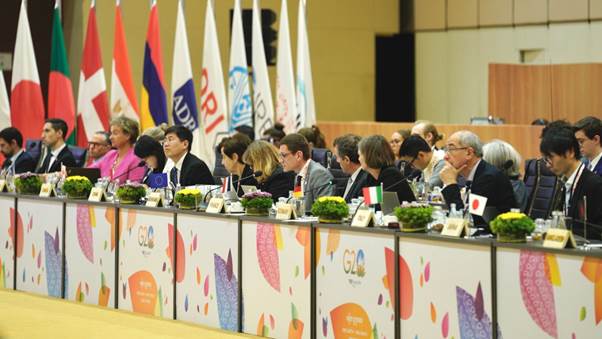
The focus of the second technical session was on land restoration and sharing of best practices on this topic. In his opening remarks for the session, Shri Bivash Ranjan, Additional Director General of Forest, Ministry of Environment, Forest and Climate Change highlighted the key inputs collated from the deliberations of the 1st ECSWG, focused group discussions and the written inputs shared by the member countries. The deliberations on the subject were in favour of a collaborative and consensus driven approach, directed at how the key inputs are being incorporated in the development of the proposed outcomes under the India Presidency. Further, Shri Bivash Ranjan appreciated the constructive inputs shared and the active participation of the countries in developing the outcomes proposed by the Presidency. The session saw engaging discussions by the delegates on the two priority landscapes identified under India’s Presidency, which are forest fire impacted areas and mining affected areas. Experts representing organisations like United Nations Convention to Combat Desertification (UNCCD) and Indian Council of Forestry Research and Education (ICFRE) delivered presentations on the proposed Gandhinagar Implementation Roadmap (GIR) on land restoration in correlation with climate change mitigation and adaptation actions; and draft publications were proposed as a compendium of best practices and development of a knowledge sharing platform respectively.
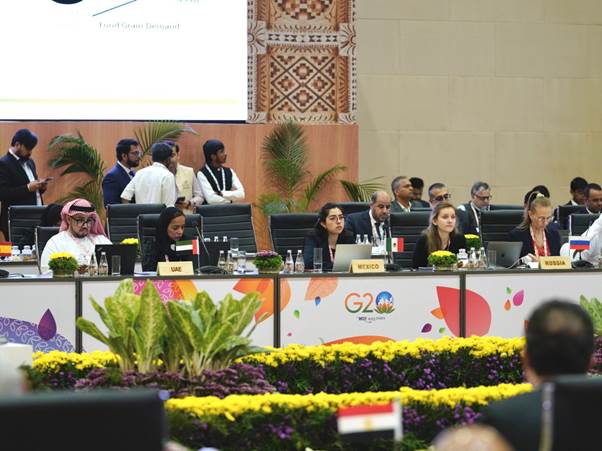
The second half of the day began with a technical session on Encouraging Resource Efficiency and Circular Economy, with presentations and release of draft G20 documents on the four sub-themes identified under the Resource Efficiency and Circular Economy priority, namely: G20 Knowledge Exchanges in Circular Economy in Steel Sector, Extended Producer Responsibility (EPR) for Circular Economy and Circular Bioeconomy, and the proposed G20 Resource Efficiency and Circular Economy Industry Coalition. The co-chair for the session, Shri Naresh Pal Gangwar reiterated India G20 Presidency’s commitment to move to efficient and sustainable use of natural resources, a key element of discussion at G20 ECSWG meetings as well as at the G20 Resource Efficiency Dialogue. He pointed out that valuable inputs were received from the member countries during the Resource Efficiency Dialogue Workshop, and has been incorporated in the Presidency documents. The representatives from G20 Countries and other participants deliberated on each of the sub themes, and appreciated India’s active involvement and engagement with the member countries for adopting an inclusive approach towards building consensus.
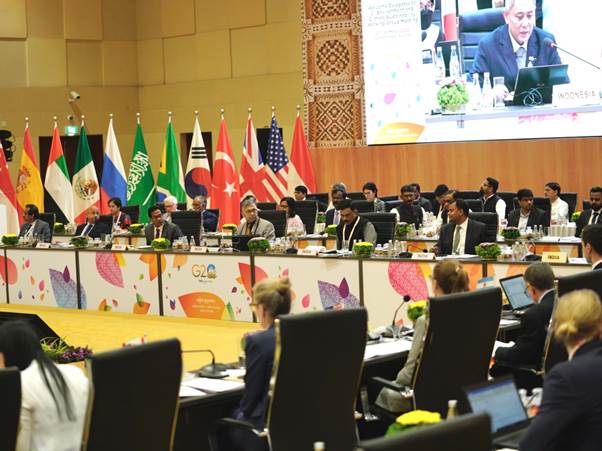
The Delegates also participated in Yoga session in morning.
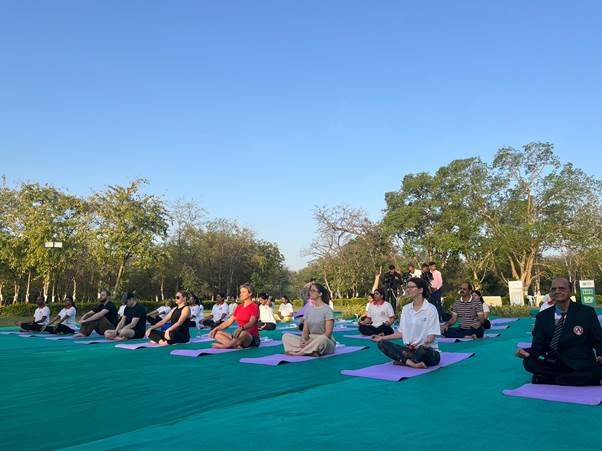
The day concluded with Media Interaction on an upbeat note to use the G20 as a forum to further the cause of tangible outcomes that can be carried forward by future Presidencies for the sustainable use of resources and the overall benefit of the Environment.
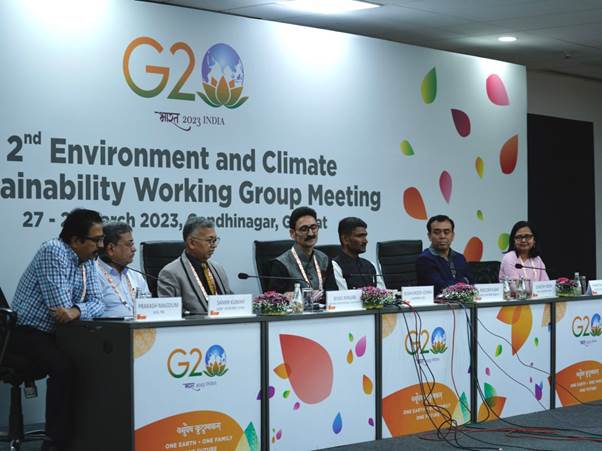
*******
MJPS/AS